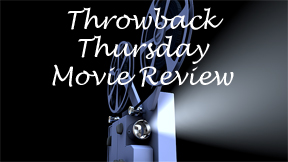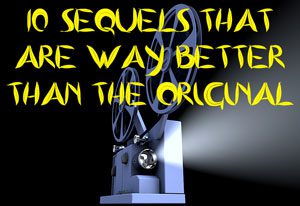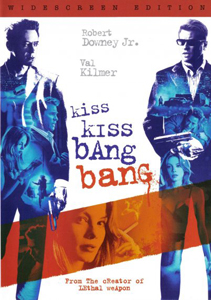Writer Shane Black, in one of the most assured directing debuts ever, delivers a great modern detective noir while also poking fun at the genre in “Kiss Kiss Bang Bang” (2005). The film marks the last great Val Kilmer performance before his slump and the start of the superstar portion of Robert Downey Jr.’s career. It’s RDJ’s first team-up with Black; they’d join forces again for the underappreciated “Iron Man 3” (2013).
A freewheeling ride
“Kiss Kiss Bang Bang” is a freewheeling – but still graspable – ride that anyone can enjoy, although cinephiles will gain an extra level of appreciation for the way Black breaks down hardboiled noir only to build a great yarn around it. He did a similar thing with the action genre in “Last Action Hero” (1993), but it’s less overt here.
This is perhaps Black’s funniest film, filled with one-liners, dark humor – often involving inconvenient corpses – and undercutting of clichés. If you follow every twist and turn of the mystery, that’s a delicious bonus, but it’s not strictly necessary, because “KKBB” could operate entirely as a comedy if need be.

“Kiss Kiss Bang Bang” (2005)
Director: Shane Black
Writers: Brett Halliday, Shane Black
Stars: Robert Downey Jr., Val Kilmer, Michelle Monaghan
Voiceovers are one of the most controversial aspects of noirs, with some people saying they add to the vibe and others arguing they are unnecessary. Thankfully, Downey is great at delivering the voiceovers that often serve as the much-needed glue for this wacky yarn. And when the story speaks for itself, the narration goes away for long stretches. It’s never intrusive.
Sometimes Black actually includes clichés in “KKBB” but puts a hat on them via Downey’s voiceover and therefore gets away with it. For example, Downey’s Harry Lockhart just happens to cross paths in L.A. with his childhood crush from his small Indiana town: Michelle Monaghan’s Harmony. Later, someone we presumed was dead turns out to be alive. Harry tells the audience that yes, these are clichés, but it’s what really happened, so he’s not gonna lie to us.
An amusing premise
“KKBB’s” very premise is funny: Harry is learning the ins and outs of detective work by shadowing Val Kilmer’s Perry. On a seemingly mundane case, things escalate – he’s targeted by the bad guys, plus he tells Harmony he’s a detective — and soon Harry is doing actual detective work (as is Harmony).
Black loves illustrating the randomness of the world, seeing genres as templates to escape from before coming back to them at the end. In “KKBB’s” most amusing sequence, Harmony falls and her gun goes off while she’s running to warn Perry. The shot alerts Perry, who is able to dodge the bad guys, who crash their car into a food truck. The irate food-truck operator then shoots the bad guys.

That’s just one of the film’s many examples of amusing randomness and Rube Goldbergian sequences.
So many parodies, even good ones, provide laughs at the expense of a good story, but “KKBB” – like all of Black’s elite work – does both. For one thing, there are the hardboiled elements of long-lost sisters and bad fathers and femme fatales.
In addition, Harry and Harmony are well-drawn, complex people. Harry is a screw-up; indeed, he stumbles into an acting career only because he sneaks into an audition room to avoid police who are on his tail.
Strong supporting players
Harmony goes a little deeper than the usual dame in stories like these. Yes, she’s the gal that every guy can get except Harry, for whom she is his dream girl. But Harmony herself is a fan of 10-cent hardboiled fiction. She loves the Johnny Gossamer series, a stand-in for Mickey Spillane’s Mike Hammer books.
Arguably a little too high a percentage of Perry’s characterization comes from the fact that he’s gay. Black, similar to “Gilmore Girls’ ” Amy Sherman-Palladino, thought the very existence of gays was something to gape at for longer than was politically correct. (See also Riggs’ homophobia in 1987’s “Lethal Weapon.”)
Perry’s nickname is “Gay Perry,” which is amusing, but Harry and some other characters are a little more obsessed with Perry’s sexual orientation (“Don’t quit your gay job,” Harry says in one of the weaker lines) than would probably be the case in a film made today.
That makes “KKBB” slightly dated, but it doesn’t detract from the masterfully crafted screenplay, along with direction and cast chemistry that allows almost every laugh to land. This is Black’s first directorial effort, and while his career since then is nothing to sneeze at, “Kiss Kiss Bang Bang” remains his masterpiece in the eyes of many fans.

